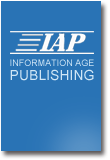
The Virtual Middle Grades Classroom
Research in Effective Pedagogy & Practice
Edited by:
Brooke B. Eisenbach, Lesley University
Nicole Miller, Mississippi State University
A volume in the series: The Handbook of Research in Middle Level Education. Editor(s): Steven B. Mertens, Illinois State University. Micki M. Caskey, Portland State University.
Call for Manuscripts
BOOK DESCRIPTION:As of 2020, 40 states had full-time virtual or blended learning opportunities for K-12 students. In the last year alone, the population of K-12 students engaging in some form of online learning in the United States increased by more than 50,000 as the pandemic brought added attention to the availability and potential for virtual education to families throughout the nation. Despite the expansion of virtual schools and programming, recent reports suggest that on average, virtual education continues to demonstrate challenges and limitations in student assessment and learning outcomes. While publishers push for a variety of books focused on teaching strategies for virtual education, there remains a need for texts that target research on middle grades online teaching and learning that supports suggested resources and pedagogical approaches. Specifically, we aim to examine research with connection to the AMLE tenets of effective middle level education. As technology and online learning have adapted to meet the demands of today’s population of virtual learners, it is essential that we provide middle level teachers and administrators with current information regarding effective virtual education to address the unique needs of young adolescents. This call is for submissions that report on empirical research that speaks to middle level teaching and learning within the virtual or online classroom context. Specifically, this call seeks research pertaining to middle level virtual teaching and learning outside the parameters of the pandemic experience.
Potential authors should submit a 300-500-word abstract, references excluded, and a 150-word bio. Abstracts should detail the topic of the proposed chapter and the research methodology. Authors should also draw upon a strong literature base. Final manuscripts should report findings of current research in middle level virtual education, not research still in progress.
TOPICS OF INTEREST:
• Characteristics of successful middle level virtual teachers and learners
• Middle level virtual teacher preparation and collaboration
• Virtual community and relationships
• Virtual pedagogy
• Virtual assessment
• Meeting needs of diverse populations and diverse abilities
• Emerging technologies in virtual teaching and learning
• Inquiries about research that explores other aspects of virtual middle level teaching and learning are welcome!
TIMELINE:
Abstracts due February 15, 2023. Authors notified of acceptance March 31, 2023. Final manuscripts are due July 31, 2023.
GUIDELINES FOR PROPOSALS:
Authors should include the following in their abstract submission:
• Author(s), affiliation(s), contact information for lead author, and up to 150-word bio for each author
• Working title and 300-500 word abstract of proposed chapter, including proposed research methodology.
Submission of a manuscript implies commitment to publish in this handbook series. Authors should not simultaneously submit this manuscript to another journal or book for publication consideration. All manuscripts will undergo a review/revision process.
MANUSCRIPTS:
Manuscripts should not exceed 30 pages (inclusive of all references and appendices) and should follow the Publication Manual of the American Psychological Association (7th ed.). Manuscripts are to be submitted electronically (as MS Word documents) and must be double-spaced with one-inch margins. Specific research methodologies and approaches including study participants, data collection protocols, and data analyses need to be described. On a separate page, include the author(s) name, professional title, institutional affiliation, and all contact information (phone, mailing address, email). Do not insert headers or footers into the manuscript. Insert page numbers in upper right-hand corner. Include a 150-word abstract. Tables and figures should be inserted in the text where appropriate. Manuscripts need to follow the accompanying Outline for Research Handbook Chapter document.
The Handbook of Resources in Middle Level Education and The Handbook of Research in Middle Level Education are endorsed by the Middle Level Education Research Special Interest Group, an affiliate of the American Educational Research Association. As stated in the organization’s Bylaws, the purpose of MLER is to improve, promote, and disseminate educational research reflecting early adolescence and middle-level education.
Send all inquiries and proposal submissions to the editors at MLERHandbook@gmail.com
BUY ONLINE
- This title is in development and is not yet available to order online. Please call the IAP office for more information: 704.752.9125

CATEGORIES
CLASSIFICATION
RELATED TITLES
-
 Common Planning Time in Middle Level Schools
Research Studies from the MLER SIG’s National Project
Common Planning Time in Middle Level Schools
Research Studies from the MLER SIG’s National Project
-
 Curriculum, Instruction, and Assessment
Intersecting New Needs and New Approaches
Curriculum, Instruction, and Assessment
Intersecting New Needs and New Approaches
-
 Equity & Cultural Responsiveness in the Middle Grades
Equity & Cultural Responsiveness in the Middle Grades
-
 Health and Well-Being in the Middle Grades
Research for Effective Middle Level Education
Health and Well-Being in the Middle Grades
Research for Effective Middle Level Education
-
 Preparing Middle Level Educators for 21st Century Schools
Enduring Beliefs, Changing Times, Evolving Practices
Preparing Middle Level Educators for 21st Century Schools
Enduring Beliefs, Changing Times, Evolving Practices
-
 Research on Teaching and Learning with the Literacies of Young Adolescents
Research on Teaching and Learning with the Literacies of Young Adolescents
-
 Voices from the Middle
Narrative Inquiry By, For and About the Middle Level Community
Voices from the Middle
Narrative Inquiry By, For and About the Middle Level Community
